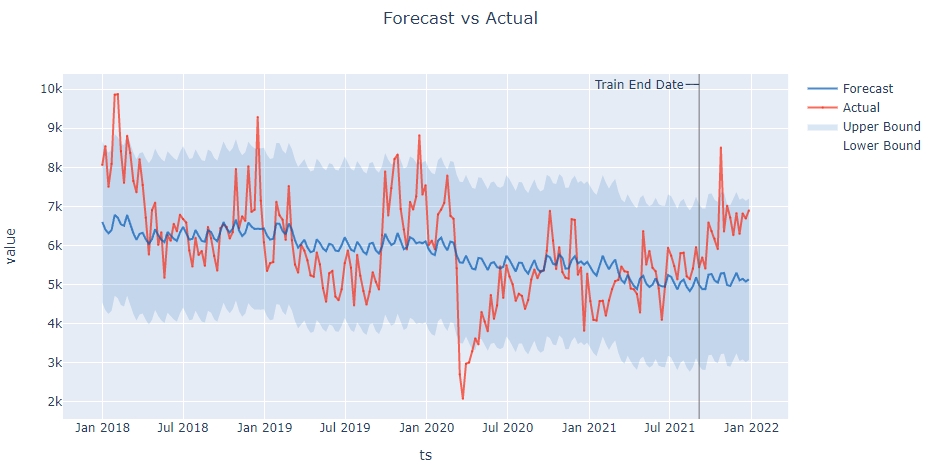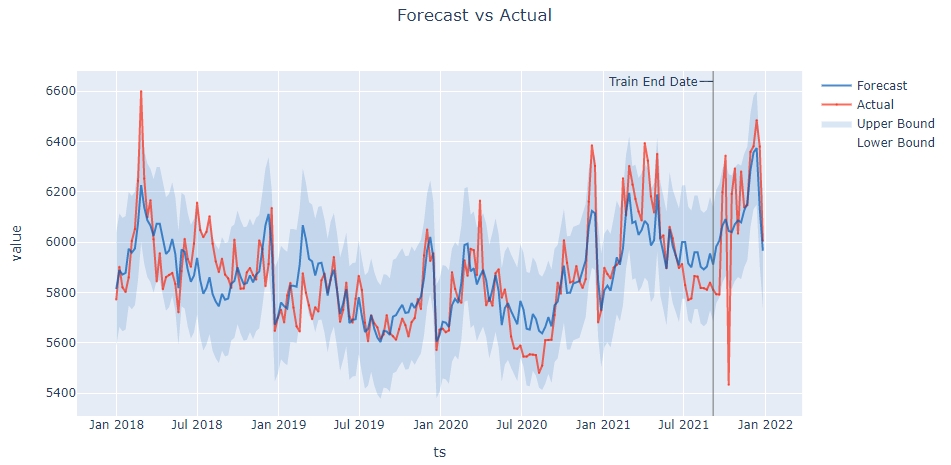I have some time series forecasts of weekly data where forecasts are too smooth or not really pronounced (not sure how to describe it). Another time series however, for the same dates, same general value range, same model parameters, shows "correct" variability. Both datasets show the same warnings when run (generally about daily event timestamps due to weekly data and a warning that data is highly fragmented)
In another dataset (I have not currently access to), removing the last entry from the time-series fixed the variability. This does however not work for the dataset1 below.
Is this a bug or intended behaviour? If this is intended, which parameters would I have to tweak to mitigate this? Thx for your help
Dataset1: relatively smooth forcast (False)

Dataset2: correct variability forecast (True)

I am using the following settings for the model (Greykite v.0.4.0):
- ForecastConfig(model_template=ModelTemplateEnum.SILVERKITE.name, forecast_horizon=16, coverage=0.95)
- metadata = MetadataParam(anomaly_info=None, date_format=None, freq='W', time_col='date', train_end_date=None, value_col='value')
- model_components =
{ 'autoregression': None,
'changepoints': {
'changepoints_dict': {
'method': 'auto',
'yearly_seasonality_order': 15,
'regularization_strength': 0.5,
'resample_freq': '7D',
'potential_changepoint_n': 25,
'no_changepoint_proportion_from_end': 0.2
}
},
'custom': {
'fit_algorithm_dict': {
'fit_algorithm': 'ridge'
}
},
'events': {
'holidays_to_model_separately': 'ALL_HOLIDAYS_IN_COUNTRIES',
'holiday_lookup_countries': ['DE'],
'holiday_pre_num_days': 4,
'holiday_post_num_days': 1,
'holiday_pre_post_num_dict': None,
'daily_event_df_dict': {
'Mothersday': date event_name
0 2017-05-14 Mothersday
1 2018-05-13 Mothersday
2 2019-05-12 Mothersday
3 2020-05-10 Mothersday
4 2021-05-09 Mothersday
5 2022-05-08 Mothersday
6 2023-05-14 Mothersday
7 2024-05-12 Mothersday
8 2025-05-11 Mothersday,
'Black Friday': date event_name
0 2017-11-24 Black Friday
1 2018-11-23 Black Friday
2 2019-11-29 Black Friday
3 2020-11-27 Black Friday
4 2021-11-26 Black Friday
5 2022-11-25 Black Friday
6 2023-11-24 Black Friday
7 2024-11-29 Black Friday
8 2025-11-29 Black Friday
}
},
'growth': None,
'hyperparameter_override': None,
'regressors': None,
'lagged_regressors': None,
'seasonality': None,
'uncertainty': None
}
DataSet1 (False):
df1 = pd.DataFrame.from_dict({'date':{0:'2017-12-31',1:'2018-01-07',2:'2018-01-14',3:'2018-01-21',4:'2018-01-28',5:'2018-02-04',6:'2018-02-11',7:'2018-02-18',8:'2018-02-25',9:'2018-03-04',10:'2018-03-11',11:'2018-03-18',12:'2018-03-25',13:'2018-04-01',14:'2018-04-08',15:'2018-04-15',16:'2018-04-22',17:'2018-04-29',18:'2018-05-06',19:'2018-05-13',20:'2018-05-20',21:'2018-05-27',22:'2018-06-03',23:'2018-06-10',24:'2018-06-17',25:'2018-06-24',26:'2018-07-01',27:'2018-07-08',28:'2018-07-15',29:'2018-07-22',30:'2018-07-29',31:'2018-08-05',32:'2018-08-12',33:'2018-08-19',34:'2018-08-26',35:'2018-09-02',36:'2018-09-09',37:'2018-09-16',38:'2018-09-23',39:'2018-09-30',40:'2018-10-07',41:'2018-10-14',42:'2018-10-21',43:'2018-10-28',44:'2018-11-04',45:'2018-11-11',46:'2018-11-18',47:'2018-11-25',48:'2018-12-02',49:'2018-12-09',50:'2018-12-16',51:'2018-12-23',52:'2018-12-30',53:'2019-01-06',54:'2019-01-13',55:'2019-01-20',56:'2019-01-27',57:'2019-02-03',58:'2019-02-10',59:'2019-02-17',60:'2019-02-24',61:'2019-03-03',62:'2019-03-10',63:'2019-03-17',64:'2019-03-24',65:'2019-03-31',66:'2019-04-07',67:'2019-04-14',68:'2019-04-21',69:'2019-04-28',70:'2019-05-05',71:'2019-05-12',72:'2019-05-19',73:'2019-05-26',74:'2019-06-02',75:'2019-06-09',76:'2019-06-16',77:'2019-06-23',78:'2019-06-30',79:'2019-07-07',80:'2019-07-14',81:'2019-07-21',82:'2019-07-28',83:'2019-08-04',84:'2019-08-11',85:'2019-08-18',86:'2019-08-25',87:'2019-09-01',88:'2019-09-08',89:'2019-09-15',90:'2019-09-22',91:'2019-09-29',92:'2019-10-06',93:'2019-10-13',94:'2019-10-20',95:'2019-10-27',96:'2019-11-03',97:'2019-11-10',98:'2019-11-17',99:'2019-11-24',100:'2019-12-01',101:'2019-12-08',102:'2019-12-15',103:'2019-12-22',104:'2019-12-29',105:'2020-01-05',106:'2020-01-12',107:'2020-01-19',108:'2020-01-26',109:'2020-02-02',110:'2020-02-09',111:'2020-02-16',112:'2020-02-23',113:'2020-03-01',114:'2020-03-08',115:'2020-03-15',116:'2020-03-22',117:'2020-03-29',118:'2020-04-05',119:'2020-04-12',120:'2020-04-19',121:'2020-04-26',122:'2020-05-03',123:'2020-05-10',124:'2020-05-17',125:'2020-05-24',126:'2020-05-31',127:'2020-06-07',128:'2020-06-14',129:'2020-06-21',130:'2020-06-28',131:'2020-07-05',132:'2020-07-12',133:'2020-07-19',134:'2020-07-26',135:'2020-08-02',136:'2020-08-09',137:'2020-08-16',138:'2020-08-23',139:'2020-08-30',140:'2020-09-06',141:'2020-09-13',142:'2020-09-20',143:'2020-09-27',144:'2020-10-04',145:'2020-10-11',146:'2020-10-18',147:'2020-10-25',148:'2020-11-01',149:'2020-11-08',150:'2020-11-15',151:'2020-11-22',152:'2020-11-29',153:'2020-12-06',154:'2020-12-13',155:'2020-12-20',156:'2020-12-27',157:'2021-01-03',158:'2021-01-10',159:'2021-01-17',160:'2021-01-24',161:'2021-01-31',162:'2021-02-07',163:'2021-02-14',164:'2021-02-21',165:'2021-02-28',166:'2021-03-07',167:'2021-03-14',168:'2021-03-21',169:'2021-03-28',170:'2021-04-04',171:'2021-04-11',172:'2021-04-18',173:'2021-04-25',174:'2021-05-02',175:'2021-05-09',176:'2021-05-16',177:'2021-05-23',178:'2021-05-30',179:'2021-06-06',180:'2021-06-13',181:'2021-06-20',182:'2021-06-27',183:'2021-07-04',184:'2021-07-11',185:'2021-07-18',186:'2021-07-25',187:'2021-08-01',188:'2021-08-08',189:'2021-08-15',190:'2021-08-22',191:'2021-08-29',192:'2021-09-05',193:'2021-09-12',194:'2021-09-19',195:'2021-09-26',196:'2021-10-03',197:'2021-10-10',198:'2021-10-17',199:'2021-10-24',200:'2021-10-31',201:'2021-11-07',202:'2021-11-14',203:'2021-11-21',204:'2021-11-28',205:'2021-12-05',206:'2021-12-12',207:'2021-12-19',208:'2021-12-26'},'value':{0:8057,1:8543,2:7500,3:8090,4:9858,5:9869,6:8414,7:7599,8:8805,9:8367,10:7650,11:7360,12:8205,13:7547,14:6710,15:5767,16:6902,17:7093,18:6013,19:6337,20:5172,21:6260,22:6120,23:6551,24:6363,25:6785,26:6675,27:6586,28:5872,29:5460,30:6195,31:5756,32:5856,33:5477,34:6472,35:6183,36:5732,37:5356,38:6440,39:6531,40:6473,41:6177,42:6343,43:7956,44:6439,45:6745,46:6628,47:8026,48:6859,49:6915,50:9287,51:7145,52:6082,53:5345,54:5546,55:5574,56:7117,57:6770,58:6660,59:6140,60:7521,61:6136,62:5511,63:5304,64:6010,65:5868,66:5615,67:5232,68:5202,69:5820,70:5514,71:4909,72:4558,73:5287,74:5342,75:4692,76:4599,77:4877,78:5545,79:5871,80:5430,81:4465,82:5759,83:5225,84:4832,85:4486,86:4818,87:5314,88:5070,89:4873,90:6263,91:7893,92:6766,93:7463,94:8210,95:8325,96:6934,97:6408,98:5899,99:7113,100:6919,101:7253,102:8818,103:7302,104:7541,105:6010,106:6122,107:5899,108:6794,109:6915,110:7089,111:7788,112:6756,113:6683,114:5414,115:2699,116:2075,117:2972,118:3004,119:3290,120:3620,121:3467,122:4297,123:4053,124:3803,125:4732,126:4120,127:4465,128:5465,129:4656,130:5495,131:5204,132:5005,133:4581,134:4761,135:4708,136:4375,137:4603,138:5127,139:5383,140:5162,141:5345,142:5358,143:5867,144:6885,145:6122,146:5395,147:5954,148:5318,149:5175,150:5152,151:6669,152:6654,153:5248,154:5436,155:3814,156:5276,157:4573,158:4096,159:4079,160:4574,161:4583,162:4201,163:4592,164:4880,165:5087,166:5116,167:5461,168:5337,169:5321,170:4897,171:4876,172:4756,173:4283,174:6367,175:5509,176:5856,177:5429,178:5338,179:4899,180:4094,181:4936,182:5940,183:5737,184:5471,185:5131,186:5799,187:5813,188:5209,189:5141,190:5408,191:5957,192:5442,193:5692,194:5408,195:6587,196:6365,197:6173,198:5907,199:8504,200:6358,201:7015,202:6714,203:6263,204:6826,205:6296,206:6818,207:6688,208:6895}})
Dataset2 (True):
df2 = pd.DataFrame.from_dict({'date':{0:'2017-12-31',1:'2018-01-07',2:'2018-01-14',3:'2018-01-21',4:'2018-01-28',5:'2018-02-04',6:'2018-02-11',7:'2018-02-18',8:'2018-02-25',9:'2018-03-04',10:'2018-03-11',11:'2018-03-18',12:'2018-03-25',13:'2018-04-01',14:'2018-04-08',15:'2018-04-15',16:'2018-04-22',17:'2018-04-29',18:'2018-05-06',19:'2018-05-13',20:'2018-05-20',21:'2018-05-27',22:'2018-06-03',23:'2018-06-10',24:'2018-06-17',25:'2018-06-24',26:'2018-07-01',27:'2018-07-08',28:'2018-07-15',29:'2018-07-22',30:'2018-07-29',31:'2018-08-05',32:'2018-08-12',33:'2018-08-19',34:'2018-08-26',35:'2018-09-02',36:'2018-09-09',37:'2018-09-16',38:'2018-09-23',39:'2018-09-30',40:'2018-10-07',41:'2018-10-14',42:'2018-10-21',43:'2018-10-28',44:'2018-11-04',45:'2018-11-11',46:'2018-11-18',47:'2018-11-25',48:'2018-12-02',49:'2018-12-09',50:'2018-12-16',51:'2018-12-23',52:'2018-12-30',53:'2019-01-06',54:'2019-01-13',55:'2019-01-20',56:'2019-01-27',57:'2019-02-03',58:'2019-02-10',59:'2019-02-17',60:'2019-02-24',61:'2019-03-03',62:'2019-03-10',63:'2019-03-17',64:'2019-03-24',65:'2019-03-31',66:'2019-04-07',67:'2019-04-14',68:'2019-04-21',69:'2019-04-28',70:'2019-05-05',71:'2019-05-12',72:'2019-05-19',73:'2019-05-26',74:'2019-06-02',75:'2019-06-09',76:'2019-06-16',77:'2019-06-23',78:'2019-06-30',79:'2019-07-07',80:'2019-07-14',81:'2019-07-21',82:'2019-07-28',83:'2019-08-04',84:'2019-08-11',85:'2019-08-18',86:'2019-08-25',87:'2019-09-01',88:'2019-09-08',89:'2019-09-15',90:'2019-09-22',91:'2019-09-29',92:'2019-10-06',93:'2019-10-13',94:'2019-10-20',95:'2019-10-27',96:'2019-11-03',97:'2019-11-10',98:'2019-11-17',99:'2019-11-24',100:'2019-12-01',101:'2019-12-08',102:'2019-12-15',103:'2019-12-22',104:'2019-12-29',105:'2020-01-05',106:'2020-01-12',107:'2020-01-19',108:'2020-01-26',109:'2020-02-02',110:'2020-02-09',111:'2020-02-16',112:'2020-02-23',113:'2020-03-01',114:'2020-03-08',115:'2020-03-15',116:'2020-03-22',117:'2020-03-29',118:'2020-04-05',119:'2020-04-12',120:'2020-04-19',121:'2020-04-26',122:'2020-05-03',123:'2020-05-10',124:'2020-05-17',125:'2020-05-24',126:'2020-05-31',127:'2020-06-07',128:'2020-06-14',129:'2020-06-21',130:'2020-06-28',131:'2020-07-05',132:'2020-07-12',133:'2020-07-19',134:'2020-07-26',135:'2020-08-02',136:'2020-08-09',137:'2020-08-16',138:'2020-08-23',139:'2020-08-30',140:'2020-09-06',141:'2020-09-13',142:'2020-09-20',143:'2020-09-27',144:'2020-10-04',145:'2020-10-11',146:'2020-10-18',147:'2020-10-25',148:'2020-11-01',149:'2020-11-08',150:'2020-11-15',151:'2020-11-22',152:'2020-11-29',153:'2020-12-06',154:'2020-12-13',155:'2020-12-20',156:'2020-12-27',157:'2021-01-03',158:'2021-01-10',159:'2021-01-17',160:'2021-01-24',161:'2021-01-31',162:'2021-02-07',163:'2021-02-14',164:'2021-02-21',165:'2021-02-28',166:'2021-03-07',167:'2021-03-14',168:'2021-03-21',169:'2021-03-28',170:'2021-04-04',171:'2021-04-11',172:'2021-04-18',173:'2021-04-25',174:'2021-05-02',175:'2021-05-09',176:'2021-05-16',177:'2021-05-23',178:'2021-05-30',179:'2021-06-06',180:'2021-06-13',181:'2021-06-20',182:'2021-06-27',183:'2021-07-04',184:'2021-07-11',185:'2021-07-18',186:'2021-07-25',187:'2021-08-01',188:'2021-08-08',189:'2021-08-15',190:'2021-08-22',191:'2021-08-29',192:'2021-09-05',193:'2021-09-12',194:'2021-09-19',195:'2021-09-26',196:'2021-10-03',197:'2021-10-10',198:'2021-10-17',199:'2021-10-24',200:'2021-10-31',201:'2021-11-07',202:'2021-11-14',203:'2021-11-21',204:'2021-11-28',205:'2021-12-05',206:'2021-12-12',207:'2021-12-19',208:'2021-12-26'},'value':{0:5772,1:5902,2:5820,3:5802,4:5860,5:6005,6:6052,7:6244,8:6600,9:6253,10:6099,11:6167,12:6011,13:5844,14:5956,15:5813,16:5861,17:5870,18:5877,19:5834,20:5721,21:5885,22:6013,23:5933,24:5902,25:5994,26:6157,27:6048,28:6020,29:6041,30:6103,31:5994,32:5923,33:5881,34:5934,35:5871,36:5856,37:5818,38:6010,39:5884,40:5815,41:5816,42:5880,43:5897,44:5869,45:5851,46:6007,47:5973,48:5825,49:5913,50:6136,51:5647,52:5700,53:5731,54:5681,55:5788,56:5838,57:5740,58:5665,59:5645,60:5876,61:5799,62:5749,63:5694,64:5741,65:5724,66:5848,67:5875,68:5800,69:5851,70:5941,71:5816,72:5683,73:5731,74:5839,75:5705,76:5680,77:5775,78:5866,79:5810,80:5680,81:5606,82:5709,83:5677,84:5661,85:5616,86:5633,87:5710,88:5638,89:5626,90:5612,91:5654,92:5696,93:5670,94:5625,95:5682,96:5698,97:5774,98:5734,99:5947,100:6050,101:5925,102:5956,103:5571,104:5652,105:5656,106:5642,107:5649,108:5881,109:5814,110:5774,111:5759,112:5928,113:5866,114:5973,115:5968,116:5869,117:6165,118:5875,119:5749,120:5779,121:5747,122:5876,123:5892,124:5779,125:5812,126:5742,127:5625,128:5578,129:5576,130:5589,131:5545,132:5545,133:5554,134:5553,135:5551,136:5480,137:5509,138:5610,139:5611,140:5612,141:5710,142:5839,143:5795,144:6008,145:5918,146:5840,147:5844,148:5905,149:5844,150:5818,151:5853,152:6161,153:6385,154:6303,155:5681,156:5729,157:5898,158:5873,159:5856,160:5899,161:5910,162:5926,163:6254,164:6107,165:6303,166:6229,167:6172,168:6122,169:6086,170:6394,171:6324,172:6182,173:6118,174:6351,175:6015,176:6027,177:5896,178:6061,179:6015,180:5946,181:5897,182:5913,183:5829,184:5770,185:5776,186:5865,187:5863,188:5818,189:5817,190:5811,191:5839,192:5811,193:5793,194:5792,195:6198,196:6344,197:5433,198:6192,199:6293,200:6034,201:6281,202:6138,203:6147,204:6359,205:6381,206:6485,207:6380,208:6006}})

 So my regressor is already forecasted and no lagging needed.
But I keep getting this error saying
So my regressor is already forecasted and no lagging needed.
But I keep getting this error saying 



